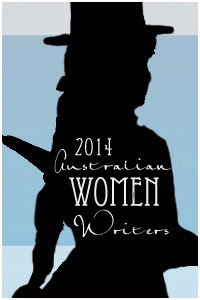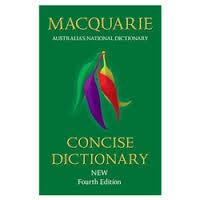Dawn Barker's Blog, page 6
February 16, 2014
Confessions of a child psychiatrist on Quartz
Over the weekend, an article that I wrote for Quartz was published. It’s called ”Confessions of a child psychiatrist: even I look for parenting advice online,” and you can read it here. It’s looks at why it is that parents are increasingly obsessed to seek parenting advice online.
Quartz is a US business website owned by the publisher of The Atlantic magazine, so I’m thrilled to have had the opportunity to write for them.
I’d love to hear your thoughts!
February 2, 2014
Australian Women Writers Challenge 2013
Last year, I participated in the Australian Women Writers challenge. It’s a great initiative to promote the writing of women in Australia, and I was thrilled to find out that last year, Fractured was the second most reviewed book!
I had hoped to read ten books written by Australian women, and looking back on my Goodreads account, I see that I actually read 24 books (almost half of all the 52 books I read last year) – 19 were fiction, 5 non-fiction. I was amazed when I totalled it up, as I didn’t think I’d read that many. I took part in several literary festivals last year, and sat on panels with many other females writers so this increased my exposure to writers whose work I may not otherwise have come across. The vast majority of the books I read were great, and I’m grateful that this challenge encouraged me to read more Australian women – a very talented bunch!I wish I had written more reviews, but with writing my second book in 2013 while promoting Fractured, I just didn’t have the time unfortunately.
Here are the qualifying books I read in 2013…
Fiction
If I Should Lose You by Natasha Lester
Thrill Seekers by Edwina Shaw
Come Back To Me by Sara Foster
Bay of Fires by Poppy Gee
Ryder’s Ridge by Charlotte Nash
Floundering by Romy Ash
Whisky Charlie Foxtrot by Annabel Smith
Pilgrimage by Jacinta Halloran
Finding Jasper by Lynne Leonard
Questions of Travel by Michelle de Krester
The Burial by Courtney Collins
How To Be A Good Wife by Emma Chapman (not strictly Australian but she was living in Australia at the time!)
House For All Seasons by Jenn J McLeod
Letters To The End of Love by Yvette Walker
The Night Guest by Fiona McFarlane
Elemental by Amanda Curtin
The Shadow Year by Hannah Richell
just_a_girl by Kirsten Krauth
Picnic at Hanging Rock by Joan Lindsay
Non-fiction
Things I Didn’t Expect (when I was expecting) by Monica Dux
The Great Feminist Denial by Monica Dux
The Birth Wars by Mary-Rose Macall
Tales from the Political Trenches by Maxine McKew
Night Games: Sex, Power and Sport by Anna Krein
I’ve signed up to read another ten books by Australian women writers this year, and you too can sign up here.
Have you read any of these books? Did the AWW challenge help you to find books that you wouldn’t have read otherwise?
January 19, 2014
The end of the edit!
A few hours ago, I pressed ‘send’ and emailed the final(ish) edits of my second novel, Let Her Go, to my editor and publisher at Hachette. I’ve been working pretty intensely on them every day for the past two weeks, so I mainly feel relief and exhaustion at the moment, with an undercurrent of anxiety!
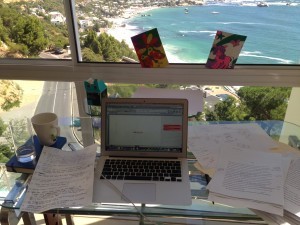
My desk at the end of two weeks of editing in Cape Town
I remember this feeling well from when I sent Fractured back post-edits. There comes a time when as a writer, you have to let go of a book. I’ve been writing this novel, off and on, for about two years: I’d written a pretty minimal draft of it before Fractured was published, and then spent most of 2013 rewriting and drafting it (in between promoting Fractured). I’m not 100% satisfied with it, but no matter how many edits I do, I don’t think I ever would be. I have to trust that my editor and publisher are looking at it with fresh, professional eyes, and if they are happy, then I will be too!
Soon, the proof copies will be printed and sent out to booksellers around the country, and then after another round of editing/proofreading, the final copies will be printed in a few months’ time before it hits the shelves in July 2014. Eek!
In the meantime, I have a lot to keep me busy! After three months in Cape Town, we’re heading back to Australia this weekend where I’ll be settling the kids back into a routine. I’ve got a few other (non-fiction) writing things going on and I’m looking forward to the Perth Writers Festival in February (as an audience member rather than a speaker this year). I also hope to start a third novel as soon as things are back to normal in Perth, and hopefully make it to some other literary festivals later in the year.
But for now, I’m looking forward to enjoying my last week with my children in Cape Town, while Let Her Go is out of my hands and into the very capable hands of Hachette!
December 29, 2013
My top books of 2013
As the end of the year approaches and lists like this pop up everywhere, I thought I’d share the books that I found most impressive in 2013. This year, I’ve been using Goodreads to keep track of the books I’ve read. Here are those that I rated 5 stars this year:
James Meek, The Heart Broke In
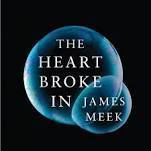 I heard about this book after seeing James Meek talk at the Perth Writers Festival in February. I bought it straight away and from the first page, knew I was settling in for a big, sprawling family drama set in the UK. It was beautifully written, witty and very moving.
I heard about this book after seeing James Meek talk at the Perth Writers Festival in February. I bought it straight away and from the first page, knew I was settling in for a big, sprawling family drama set in the UK. It was beautifully written, witty and very moving.
Hannah Richell, The Shadow Year
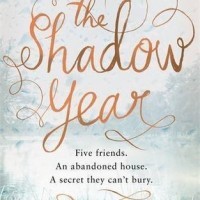 I read Hannah’s first book, The Secret of the Tides last year, and loved it. The Shadow Year is another big book, and one that I couldn’t put down. It’s dramatic, clever, and full of emotion with a dark streak.
I read Hannah’s first book, The Secret of the Tides last year, and loved it. The Shadow Year is another big book, and one that I couldn’t put down. It’s dramatic, clever, and full of emotion with a dark streak.
Amanda Curtin, Elemental
 Amanda is in a writing group with me, but I promise that’s not why I gave this book five stars! Amanda writes beautifully, in rich, elegant prose. This book is set in both Western Australia (where I now live), and the northeast coast of Scotland (where I grew up) so I was immediately immersed in the settings that are so vividly described. I could feel the chill of the north sea in my fingers and the smell of the fishwifies as I read. Loved it.
Amanda is in a writing group with me, but I promise that’s not why I gave this book five stars! Amanda writes beautifully, in rich, elegant prose. This book is set in both Western Australia (where I now live), and the northeast coast of Scotland (where I grew up) so I was immediately immersed in the settings that are so vividly described. I could feel the chill of the north sea in my fingers and the smell of the fishwifies as I read. Loved it.
Donna Tartt, The Goldfinch
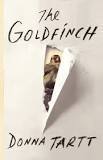 A big, complex, narrative. It took me a few chapters to get into this book, but when the central event kicked in, I was hooked. It felt Dickensian: larger than life characters who were not completely realistic, but it didn’t matter. I was engaged and entertained throughout the 800 pages!
A big, complex, narrative. It took me a few chapters to get into this book, but when the central event kicked in, I was hooked. It felt Dickensian: larger than life characters who were not completely realistic, but it didn’t matter. I was engaged and entertained throughout the 800 pages!
David Vann, Goat Mountain
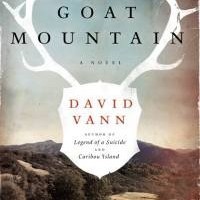
I absolutely loved Vann’s Caribou Island and so had high expectations of this book, and I was so pleased that this was as good, if not better. He has such a talent for evoking a sense of place, and I felt like I was with the 11 year old narrator on the slopes of Goat Mountain as I read this. This is a small, gruesome story and some of the images kept me up at night. It’s as chilling as any horror story, because it’s so realistic. This is not a book I’ll forget.
Kate Atkinson, Life After Life
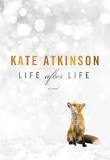 Oh, how I’ve loved this book. I’m actually not quite finished it (I’m listening to the audiobook while I run, so I need to do a bit more exercise!) but the ‘voice’ of this book is beautiful and I’ve been hooked from the start. It’s one of those rare books that I can’t wait to listen to and I don’t want it to end. I have a great admiration for Atkinson’s skill as a writer as it’s a complex, multi-layered story that manages to integrate historical facts into a beautiful drama that keeps you intellectually engaged as you try to piece together the multiple strands. It’s had me in tears many times and I have complete writer envy! I wish I had written this!
Oh, how I’ve loved this book. I’m actually not quite finished it (I’m listening to the audiobook while I run, so I need to do a bit more exercise!) but the ‘voice’ of this book is beautiful and I’ve been hooked from the start. It’s one of those rare books that I can’t wait to listen to and I don’t want it to end. I have a great admiration for Atkinson’s skill as a writer as it’s a complex, multi-layered story that manages to integrate historical facts into a beautiful drama that keeps you intellectually engaged as you try to piece together the multiple strands. It’s had me in tears many times and I have complete writer envy! I wish I had written this!
Ned Vizzini, It’s Kind Of A Funny Story
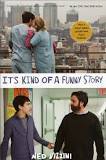 This was published in 2006, and I’m shocked that I’ve only just read it as it deals with a subject close to my heart as a child psychiatrist: a (fictional) story of a teenager admitted to an adult psychiatric ward. I’m sorry to say that I only heard about it after the very recent death of the author, Ned Vizzini, who took his life this month at 32 years of age. It’s with that knowledge that I read the book, which made the accounts of a teenage boy’s battle with depression all the more affecting. It’s clear to me as a psychiatrist that the author has used some of his own experiences of the mental health system to write this book as it’s incredibly authentic. It’s kind of funny, but it’s also not at all funny. I will now recommend this book to all mental health staff and psychiatrists in training. This is a young adult version of Plath’s The Bell Jar.
This was published in 2006, and I’m shocked that I’ve only just read it as it deals with a subject close to my heart as a child psychiatrist: a (fictional) story of a teenager admitted to an adult psychiatric ward. I’m sorry to say that I only heard about it after the very recent death of the author, Ned Vizzini, who took his life this month at 32 years of age. It’s with that knowledge that I read the book, which made the accounts of a teenage boy’s battle with depression all the more affecting. It’s clear to me as a psychiatrist that the author has used some of his own experiences of the mental health system to write this book as it’s incredibly authentic. It’s kind of funny, but it’s also not at all funny. I will now recommend this book to all mental health staff and psychiatrists in training. This is a young adult version of Plath’s The Bell Jar.
How about you? What were the books you rated best in 2013? Do you agree or disagree with my choices?
December 11, 2013
Kirsten Krauth: I’ll show you mine if you show me yours.
 Kirsten Krauth is a freelance writer and editor, a mother, and a debut novelist. Her first book, just_a_girl was published in June 2013 by UWA publishing to critical acclaim. She is also an active blogger, and has recently started a tandem blog series where she and another author review each other’s book, focussing on similarities between the work. She began with Walter Mason’s Destination Cambodia (you can read Walter’s post about just_a_girl here). Kirsten asked me to be part of this “I’ll show you mine if you show me yours” project and I was really pleased to be asked as just_a_girl had been on my virtual to-read pile for a while.
Kirsten Krauth is a freelance writer and editor, a mother, and a debut novelist. Her first book, just_a_girl was published in June 2013 by UWA publishing to critical acclaim. She is also an active blogger, and has recently started a tandem blog series where she and another author review each other’s book, focussing on similarities between the work. She began with Walter Mason’s Destination Cambodia (you can read Walter’s post about just_a_girl here). Kirsten asked me to be part of this “I’ll show you mine if you show me yours” project and I was really pleased to be asked as just_a_girl had been on my virtual to-read pile for a while.
I was initially interested in reading just_a_girl because I’d heard that it was a confronting look at the life of a young adolescent girl. As I’ve worked with many teenagers in my role as a child psychiatrist, I know that lots of adolescents have lives that they keep secret from their parents. I’ve also seen the pervasive nature of the internet on adolescents’ lives: the pull of social media, ‘cyberbullying’, and the shifting of social interactions from face-to-face to virtual. Online interactions are different to those in the real world: there is a sense of anonymity, a façade of re-invention, a disinhibition. There was a time when I would have been shocked to hear what some young girls experience, but not any more. Layla, the protagonist in just_a_girl is caught up in all the risky behaviours that we hope our own daughters will avoid: precocious sexual activity, drug and alcohol abuse, cyber bullying and emotional turmoil.
Just_a_girl has three interwoven story strands: Layla, her mother Margot, and one of a man whom Layla encounters on the train, Tadashi.
The story of Margot was the one that had most relevance to my own writing. In Fractured, I wrote about a new mother – Anna – descending into mental illness, and while Margot is not as acutely unwell as my character, there were some sections where her struggles with a newborn reflected the same issues. However, there’s an element of passivity in Margot that had the potential to make her difficult to empathise with. The reader knows that Layla is engaging in very risky behaviour while Margot seems to do very little to stop the slide, and even contributes to the risk. But my own sympathies were aroused by knowing that she herself had poor parenting from her own mother, and is trying the best she can with the little she has. Descriptions of her early months of motherhood show us that Margot has tried her best to be a good mother to Layla, and in the beginning was not that different to many of us. As a mother myself, I could certainly relate to some of her emotions:
“And I felt like giving up, putting her in the cot and lying down on my bed and hopefully going to sleep forever, because I never got the chance to catch up, never had a moment to think about anything, and it was a continual grind grind grind when Geoff was home late and up early and after Layla went to bed at seven I would stagger to the kitchen with barely enough energy to put two bits of bread in the toaster and spread them with Vegemite…and sometimes it was just easier to pour a glass of wine instead and lie on the couch.”
The relationship between Layla and Margot is at the heart of just_a_girl, and this parent-child relationship is what interests me professionally in both psychiatry and writing. In the novel, we don’t see much direct interaction between the two, but by allowing us access to the internal worlds of both Layla and Margot, Krauth captures so well the words they both wish they could express to each other. Some of the more moving passages in the book refer to the missed communication between them. An example of this is when Margot says:
“…I still wonder whether Layla’s been punishing me ever since because she looks at me in the same way with those dark unblinking eyes, and I feel like I’m being judged, for letting her fall, for letting her father go, for giving her the bottle too early, and I want to undress her and put her in the bath like I used to and wash her tummy and hold a face washer to stop the soap from getting in her eyes and say I’m sorry.”
And Layla, when she had the realisation that Margot is more than just her mother, says:
“And it hits me for the first time. She’s not just my mother. She’s a woman living alone. She’s uncertain of the future. She’s waiting for something to happen. She doesn’t have any friends. She’s shy. She’s beyond lonely.”
At the start of the novel, I wondered if Layla was too mature. Young adolescents may behave in a sexually precocious way, but usually lack the emotional maturity to cope with the intense emotions. I felt at times that Layla was a bit too powerful, too tough emotionally, but as the novel progressed, we saw small hints of vulnerability from her that reminded us that, after all, she was just a child, just a girl: the way she tried to hide her face, swollen from crying, after an episode of abuse; and the way she questions why an older man, a stranger she met on the internet, abandons her in a hotel room:
“Was I too tall, too fat, too thin, too smart, too hairy, too sweet, too knowing, too sexy, too talkative, too self-conscious, too angry? Too fucking alive?”
There is a third thread in just_a_girl, of a really interesting (and very original) character called Tadashi. His was the story that engaged me the least, not because of any flaw in the writing – his character is extremely well written – but perhaps because he is an odd man that I personally couldn’t identify with. He, like Layla, uses the internet for sexual fulfilment, though in a very different way – a cold, impersonal way. There were questions raised in my mind as to his sanity, and I found him quite creepy and without warmth, unlike Layla and her mother, who felt like real characters that I might know.
All the characters long for a meaningful connection: Margot tries to find it in an evangelical church, but unwittingly puts her daughter at even higher risk; Layla tries to find validation of herself through sex – with peers and strangers – but remains empty; Tadashi represents the extreme of emptiness, being unable to form any sort of relationship at all, and social connections exist only in his mind. However, all three characters emphasise issues that were close to my heart when I wrote Fractured: the sense that families hold secrets close because of shame, guilt, or mistrust, fear of abandonment.
Overall, just_a_girl is deceptive. It’s a book that I found compelling, brilliantly written, and on the surface, easy and quick to read. But it was afterwards that the themes still resonated with me: power, relationships, of love and failure, of vulnerability and abuse.
Have you read just_a_girl? Do you think it has similar themes to Fractured? You can read Kirsten’s thoughts on Fractured here.
December 10, 2013
Waking in Cape Town
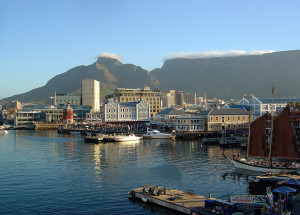
Cape Town waterfront by Andreas Tusche
It felt like something should be different this morning when I looked out of the window to the white-capped waves of the beachside bays of Cape Town. My family has moved here for three months for work; we’ve been here for only a few weeks but have grown to love this beautiful, welcoming, multicultural city. But as I switched on the news, our rental house was still huddled against the steep slopes of the Twelve Apostles, tour buses still struggled up the winding roads, hadeda birds still called, and joggers still puffed along on early morning runs. But at the same time as I’d gone to sleep last night, Nelson Mandela had died. Only yesterday, I’d looked up the ferry schedule, planning a visit to Robben Island. Three nights ago, I’d watched a documentary about him, and my husband and I had remarked on how far the country had come in the twenty or so years since the end of apartheid. A week ago, I’d explained to my young children who Mandela was, as we looked at a statue of him in the beautiful Kirstenbosch botanic gardens below Table Mountain. Over breakfast, I tried to explain to my four year old that he had died. Did she remember what I’d told her about Mandela, in the gardens? She said that she did: he had made everything peaceful.
Not surprisingly, there’s sadness in the air of Capetown today. I cried when I watched the news this morning. Flags are flying at half-mast. But here, in South Africa, there are other emotions swirling around: a sense of celebration of his life. Of anticipation, perhaps. There are rumours of a ‘war’, of South Africa burning, of white people being attacked, but most are quick to laugh at these fears. Emotions are intense, here and around the entire world.
I feel that the grief in the air does not belong to me. I am a visitor, looking at the people of this nation who truly understand Mandela’s legacy. The world will mourn, but the grief belongs to the people of South Africa, the people of Mandela’s homeland, and ultimately, his family.
My daughter just showed me a drawing that she did, of her and her sisters playing with new friends in the park we visited yesterday. The other children in the picture are coloured in brown pencil. Her own hair is drawn in brown too, while her sisters have yellow hair. They all have different coloured dresses on. I said it was a lovely picture; she smiled then moved onto drawing another. To her, there was nothing remarkable about the girls in the park: they are just friends. That’s the legacy of Nelson Mandela.
December 9, 2013
The Reading Room’s Most Dazzling Debut?
I was very excited to see that Fractured is in The Reading Room’s shortlist for “The Most Dazzling Debut” in their Best Books of 2013 awards. There are some huge titles on the list (Burial Rites and The Rosie Project!) so I’m thrilled to be listed alongside them.
You can vote here - and it doing so, go in the draw to win an iPad mini!
November 26, 2013
Writers ask writers: Tools of the Trade
For November’s “Writers Ask Writers” post, we are discussing our ‘tools of the trade’. We are joined by Angela Savage, an author I met recently at the Brisbane Writers Festival.
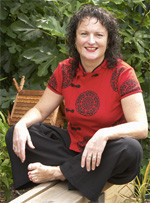 Angela is a Melbourne-based crime writer, who has lived and travelled extensively in Asia. Her first novel, Behind the Night Bazaar won the 2004 Victorian Premier’s Literary Award for an unpublished manuscript. She is a winner of the Scarlett Stiletto Award and has twice been shortlisted for Ned Kelly awards.
Angela is a Melbourne-based crime writer, who has lived and travelled extensively in Asia. Her first novel, Behind the Night Bazaar won the 2004 Victorian Premier’s Literary Award for an unpublished manuscript. She is a winner of the Scarlett Stiletto Award and has twice been shortlisted for Ned Kelly awards.
Her latest novel is The Dying Beach.
You can read more about Angela and her books here.
One of the best things about writing is that it doesn’t require many tools: the words come from within us, and we simply need a method of recording them. But there are few things that, over the years, have made it into my toolbox:
Laptop
I write in various places: my local library and cafes while my children are at home with a babysitter, and at home while they sleep. I write straight onto my computer, and love my laptop for its portability.
Notebook
At the start of each new novel, I buy myself a new notebook to keep everything together. I use it to jot down ideas, plot points, problems, time line issues, research etc. Once I’ve solved a problem, I score it out so that when I flick through the pages, I can find the issues that I still need to fix, and ideas that I’ve had. I keep this notebook with me at all times, including next to the bed at night, so that if ever I have an idea, I can quickly jot it down then go to the computer the following day and use it to write.
Scrivener
For those of you who don’t know, this is a programme designed specifically for writers. I didn’t use it when I was writing Fractured. For that novel, I wrote in Word, but then when I go to the end of my 100000 word+ draft, it was very tricky to move scenes around and find my place. So, for my second novel, I wrote each scene in Scrivener, up until my third draft, which is when I felt that I had the structure of the book almost right. For some reason, I still prefer the ‘look’ of Word and the editing and formatting ability, so I’m currently using that as I fine-tune the book.
Books
When I’m writing, I try not to read too many other novels with similar themes to what I’m writing: I worry that I’ll either unconsciously steal ideas or phrases from the other writer, or that I’ll feel restricted because I’m worrying about using others’ intellectual property. When I edit, though, these are the books on my desk:
My Macquarie Dictionary. I look up words that I’m unsure of, and am often amazed to learn that words don’t mean what I think they do or that I’m using them in the wrong context!

My Oxford American Writer’s Thesaurus. I love this thesaurus. I try not to use it too often, as I don’t like to use worlds in my writing that I don’t often use in everyday writing (I hate reading books that make me feel dumb for not knowing the meaning of unusual words), but sometimes I do need to try and find another word to replace one I’ve used over and over. What’s great about this thesaurus it includes lots of mini-essays by writers (Including Zadie Smith, David Foster Wallace and Simon Winchester). It also has paragraphs explaining which word is right in which context (e.g. knowledge-v-information-v-scholarship-v-learning-v-erudition-v-pedantry-v-wisdom) and lists of subtypes of words, e.g. 38 types of windows, over 40 names of wines and teas!
I had the pleasure of doing a grammar workshop a few years ago with Mark Tredinnik and use these two books regularly: his Little Red Writing Book and Little Green Grammar Book.
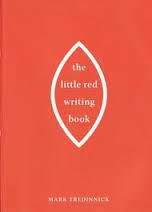
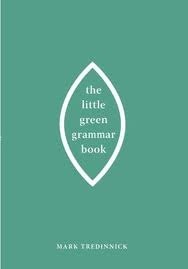
Drinks
If I write in the morning, a strong flat white. If I write in the evening once the children have fallen asleep, a big glass of wine.
Now read about what these other authors use as their tools of the trade:
Our guest blogger, Angela Savage, whose writing tools are ‘so basic, they’re almost quaint’…
Annabel Smith, who lists some practical things (including chocolate!) but for whom the most important tools are the ‘intangible things like inspiration and time to write’…
Amanda Curtin who has a love of stationary, except when her late cat, Daisy, ate it all…
Sara Foster, who mentions that all important tool: a babysitter!
Natasha Lester, who also uses Scrivener as ‘her most loved tool’
Emma Chapman, whose heart races at a trip to the stationary shop…
November 13, 2013
A change of scene
It’s been a busy year for me. Fractured was published in Australia at the end of February, and since then I’ve been busy promoting it as well as finishing off my second novel, which is now with the editors at Hachette.
As many of you know, I also have three young children, and I’ve been trying to juggle childrearing with work as a writer while my husband has been travelling for work. And now, it’s time for us to spend some time together as a family. This weekend, we are all boarding a flight to go and spend almost three months in Capetown, South Africa.

Cape Town waterfront by Andreas Tusche
I’d like to say it’s a holiday, but my husband will be working there, and so will I. On the 6th January, I’ll begin an intensive two-week structural edit of my second novel. But while it won’t be a holiday in the traditional sense, I’m very excited about the change of scenery. It’s a chance for me – and my children – to experience life in another country, to explore and learn about someone else’s history and culture. I’ll be finishing off one novel, and hopefully starting to write another, my third. As well as visiting the usual tourist destinations, I plan to wander in South African bookshops, find books by their own local authors and read lots of African literature.
In late January, we’ll return to Perth and settle back into our routine. The proofs of the book will be printed in February, then there’ll be more editing and final touches before publication in July 2014.
I may be quiet over the next few months, but I’ll still be writing. It’s what I love about this profession: I can write anywhere, and I know that experiences from South Africa will seep into my work.
November 10, 2013
Author interview with Annabel Smith
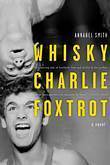 Today, I’m really happy that Annabel Smith has agreed to answer a few questions about her writing. I first met Annabel at Perth Writers Festival in 2013, where I bought her second novel, Whisky Charlie Foxtrot. I loved the book, mainly because Annabel managed to capture the intricacies of sibling relationships so well. Whisky Charlie Foxtrot has since been shortlisted for the Small Press Network’s Most Underrated Book Award 2013 (the winner will be announced on the 15th November and I have my fingers crossed!)
Today, I’m really happy that Annabel Smith has agreed to answer a few questions about her writing. I first met Annabel at Perth Writers Festival in 2013, where I bought her second novel, Whisky Charlie Foxtrot. I loved the book, mainly because Annabel managed to capture the intricacies of sibling relationships so well. Whisky Charlie Foxtrot has since been shortlisted for the Small Press Network’s Most Underrated Book Award 2013 (the winner will be announced on the 15th November and I have my fingers crossed!)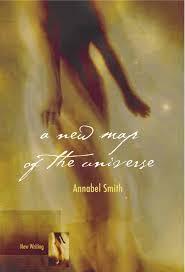
Annabel’s first novel, A New Map of the Universe, was shortlisted for the WA Premier’s Book Awards. In 2012 she was selected by the Australia Council as one of 5 inaugural recipients of a Creative Australia Fellowship for Emerging Artists. She has been writer-in-residence at Katherine Susannah Prichard Writers Centre and the Fellowship of Australian Writers (WA), had short fiction and commentary published inWesterly and Southerly and holds a PhD in Writing from Edith Cowan University.
1. You are the author of two novels – A New Map of the Universe, and Whisky Charlie Foxtrot. Can you tell us about your journey to publication?
I wrote A New Map of the Universe as part of a PhD in Creative Writing at Edith Cowan University. When I finished, UWA Publishing were seeking manuscripts for a new fiction series they were planning to launch. They called me within a few days to say they were very interested and then kept me on tenterhooks for eight months before making a final decision! A New Map of the Universe became one of two books, alongside Josephine Wilson’s Cusp, to launch the new series in October 2005. When I finished Whisky Charlie Foxtrot in 2008 I attempted to find an agent to represent me in the hopes of being published by a larger publishing house. I was unsuccessful in finding an agent and so I began submitting the manuscript to Australia’s small independent presses. After three years and almost twenty rejections in total, it finally found a home at Fremantle Press.
2. You hold a PhD in Writing. What effect has studying writing at such a high academic level had on your creative writing?
If you are lucky with your supervisor, writing a book as part of a PhD is equivalent to having an editor working with you from page one of the manuscript. My supervisor, Richard Rossiter, was also an amazing mentor, counsellor and cheerleader. It is not an exaggeration to say that without him the book would never have seen the light of day. The other huge benefit to the PhD was workshopping my writing with other early career writers, including Danielle Wood and Donna Mazza. Having intensive feedback from other writers taught me so much, as well as the process of critiquing their work.
3. Your first novel, A New Map of the Universe, was shortlisted for the WA Premier’s Book Awards. Congratulations! What was that experience like for you?
It was surreal. It had never crossed my mind that the book might be shortlisted for any awards, and I came back from my honeymoon to find this extraordinary letter amidst a pile of extremely dull mail. I was thrilled and completely taken aback.
4. Your latest novel, Whisky Charlie Foxtrot, is a beautiful story that ultimately deals with the complexities of sibling relationships. What was your inspiration for writing it?
I think family life is rich with dramatic possibilities. What led me towards exploring it that particular aspect of family life was my father having a falling out with his only brother which resulted in them not speaking for a decade. I wanted to understand how two people who had grown up together could reach a point where they didn’t speak for ten years, so at some level I think I wrote the book to answer that question. 5. You write in different genres and forms: short stories, literary fiction, interactive and speculative fiction. Do you find it easy to shift between these? Do you have a preference for one particular type of writing? I never consciously set out to write in a certain form. I begin with a character or a scenario in mind and then I let the story find the form it needs to tell itself best. When I move from one major project to another, there’s some grinding and clunking as I find the right gear, but once I’ve found it, I quickly start to feel at home there. I enjoy the challenges each form presents me with but I struggle with short stories. I just seem to need longer than a few thousand words to get to the heart of an idea, and I never know how to finish.
5. What are you working on at the moment?
I’m working with a very talented creative team to create an app to accompany my third novel The Ark, a speculative fiction set in a post-peak oil scenario which will be published in early 2014. I’m also halfway through a first draft of my fourth novel, Monkey See, which is a contemporary take on the classic epic quest stories. And, because I’m a glutton for punishment, I’m also making notes for a fifth novel, which will be a return to contemporary family drama, like my first two novels, and will explore post-natal depression.
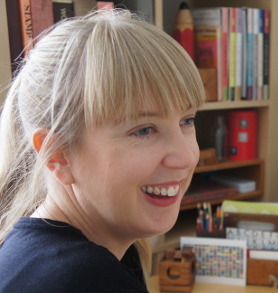 You can read more about Annabel and her work on her webpage, Facebook or Twitter.
You can read more about Annabel and her work on her webpage, Facebook or Twitter.

